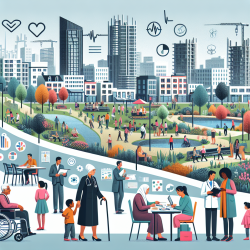Introduction
Gentrification, a process marked by the influx of investment and subsequent neighborhood changes, has been a topic of interest for urban planners, sociologists, and public health professionals. The study titled ‘Gentrification is not improving my health’: a mixed-method investigation of chronic health conditions in rapidly changing urban neighborhoods in Austin, Texas, provides valuable insights into how these changes impact the health of residents, particularly in terms of chronic health conditions (CHCs).
Key Findings
The study employed a mixed-method approach, using oral history interviews, electronic interviews, and a structured survey to assess the health impacts of gentrification on 331 residents in Austin. The findings revealed significant variations in perceived gentrification scores based on marital status, educational attainment, and gender. Furthermore, gentrification was positively associated with self-reported chronic health conditions (SR-CHCs), even after adjusting for socioeconomic variables.
Implications for Practitioners
As practitioners in the field of speech-language pathology, understanding the broader social determinants of health is crucial for creating effective intervention strategies. The study highlights the importance of considering the socio-cultural and physical environment when assessing and treating children with speech and language disorders. Here are some ways practitioners can leverage these findings:
- Community Engagement: Engage with the community to understand the specific challenges faced by residents due to gentrification. This can help tailor interventions that are culturally and contextually relevant.
- Holistic Assessment: Incorporate assessments that consider the social and environmental factors affecting a child's health. This includes understanding the family’s socioeconomic status and access to resources.
- Advocacy for Resources: Advocate for policies that ensure equitable access to healthcare and educational resources in gentrifying neighborhoods. This can mitigate the adverse effects of gentrification on health.
Encouraging Further Research
The study underscores the need for continuous empirical research to explore the nuanced relationship between gentrification and health outcomes. Practitioners are encouraged to collaborate with researchers to investigate how gentrification affects specific health conditions, including speech and language disorders. Such collaborations can lead to data-driven policies and interventions that promote health equity.
Conclusion
Understanding the impacts of gentrification on health is essential for speech-language pathologists aiming to improve outcomes for children in urban settings. By integrating the insights from this study into practice, practitioners can contribute to more holistic and effective care. For those interested in delving deeper into the research, the original study offers a comprehensive analysis of the social determinants of health in the context of urban neighborhood changes.
To read the original research paper, please follow this link: ‘Gentrification is not improving my health’: a mixed-method investigation of chronic health conditions in rapidly changing urban neighborhoods in Austin, Texas.










